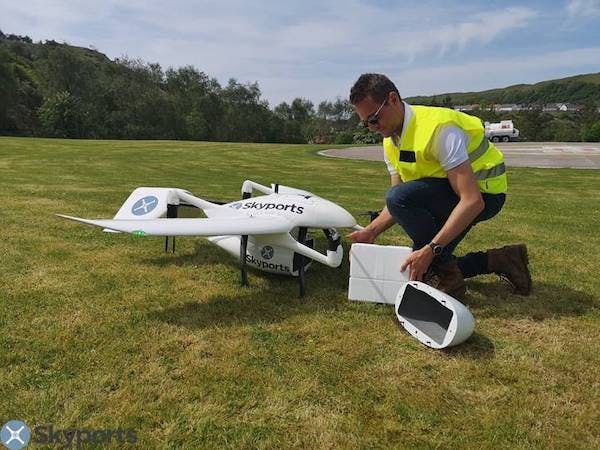Drones news
Skyports collaborates on space-enabled drone deliveries for NHS in Scotland
<p><strong>Drone delivery service provider Skyports has collaborated with technology communications company Vodafone and digital consultants Deloitte to transport medical supplies and samples for the NHS in Scotland using drones. The live flights will take place later this year and will use mobile connectivity and space-based technology. The Skyports-led project was selected following a drive to find space-enabled technology and services that can support the NHS response to coronavirus and stop the spread of the disease in a joint funding initiative between the UK Space Agency (UKSA) and the European Space Agency (ESA). In the coming months, Skyports will start delivering pathology samples, medicine, essential personal protective equipment (PPE) and COVID-19 testing kits between hospitals and to and from medical practices in Argyll and Bute on the west coast of Scotland.</strong></p>
<p><strong><img alt="" src="http://images.vfl.ru/ii/1594539912/b6fe05fe/31054414.jpg" style="height:382px; width:600px" /></strong></p>
<p>Through Skyports’ technology, pick-ups that currently take up to 48 hours to be transported between healthcare sites will take only 30 minutes and with a much higher frequency. NHS staff will be able to make on-demand and scheduled requests to use Skyports drones, via a web customer interface developed by Deloitte. The drones will be remotely piloted from the Skyports Operations Centre in Argyll and Bute and will fly automatically along predefined routes. Communication between the drone and the ground control station (GCS) will be provided using Vodafone’s 4G network and satellite communications, as well as Earth observation data, to ensure connectivity coverage is provided at all times for safety reasons.</p>
<p>By the end of the project, Skyports aims to integrate its operations into the local NHS supply chain, build its route network and create a foundation drone delivery service that can be scaled for permanent operations.</p>
<p>In May, Skyports completed a trial drone delivery operation to fly essential medical cargo between two hospitals in the Scottish Highlands to assist the NHS and the government in the battle against COVID-19. Skyports is also working with the Argyll and Bute HSCP as part of its involvement in the CAA Regulatory Sandbox.</p>
<p><img alt="" src="http://images.vfl.ru/ii/1594539946/d736c411/31054415.jpg" style="height:401px; width:600px" /></p>
<p><strong>Duncan Walker, Chief Executive Officer at Skyports, said:</strong> “Using drone deliveries within supply chains can create significant time and cost savings. This project is a natural progression from our recent trials with the NHS in Scotland as we scale and develop our operations, supporting a wider network of hospitals and medical practices as they continue to respond to the COVID-19 pandemic. We want more healthcare facilities to benefit from our service over the long-term and the experience of this important initiative will put us another step closer to permanent operations that the whole of the NHS could soon benefit from.”</p>
<p><strong>Anne Sheehan, Director, Vodafone Business UK, said:</strong> “There will be huge benefits from the use of drones connected to the mobile network that can be flown safely and securely beyond line of sight. This is a brilliant example of how using connected drones can radically change the way things are done, and really change people’s lives.”</p>
<p><strong>Scott Campbell, partner and leader in Deloitte Ventures, said</strong>: “Drones have the potential to revolutionise the delivery of urgent goods and services for remote locations. Hard-to-reach communities in Argyll and Bute will benefit from drones as an alternative to land or sea transportation. This project is a powerful example of the value that drones could bring to communities and wider society in the coming years, as businesses collaborate to further develop the technology.”</p>
<p><img alt="" src="http://images.vfl.ru/ii/1594539974/ca67d0d8/31054416.jpg" style="height:401px; width:600px" /></p>
<p><em>Drone Delivery Demand</em></p>
<p><em>Around the world drones are already being used to deliver products more quickly, cheaply and efficiently than ground transport alternatives, especially in heavily congested cities and hard-to-reach rural areas. Drone deliveries can reduce costs, improve the frequency and speed of transport, optimise supply chains and improve connectivity to underserved areas.</em></p>
<p><em>The drone package delivery market is projected to be worth £21 billion (US$27.4 billion) by 2030[1] Increasing amend for faster deliver deliveries, changes to the regulations to enable drone deliveries and the proliferation of low-cost and light-payload drones are fuelling the growth of the drone logistics market.</em></p>
7/12/2020
10530
